Reads from her novel Crimson Lake.
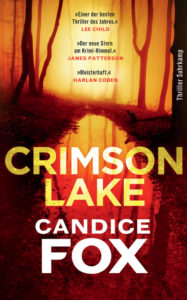
Six minutes in the wrong place at the wrong time—that’s all it took to ruin Sydney Detective Ted Conkaffey’s life. Accused but not convicted of the brutal abduction of a 13-year-old girl, Ted is now a free man—and public enemy number one. He flees north to keep a low profile amidst the steamy, croc-infested wetlands of Crimson Lake.
There, Ted’s lawyer introduces him to private investigator Amanda Pharrell, herself a convicted murderer. Perhaps it’s the self-isolation and murderous past that makes her so adept at tracking lost souls in the wilderness, but her latest target, missing author Jake Scully, has a life more shrouded in secrets than her own.
Not entirely convinced Amanda is a cold-blooded killer, Ted agrees to help with her investigation, a case full of deception and obsession, while secretly digging into her troubled past.
Candice Fox received Australia’s most prestigious prize for crime fiction, the NED KELLY AWARD, both in 2014 and 2015!
Sechs Minuten – mehr braucht es nicht, um das Leben von Detective Ted Conkaffey vollständig zu ruinieren. Die Anklage gegen ihn wird zwar aus Mangel an Beweisen fallengelassen, doch alle Welt glaubt zu wissen, dass einzig und allein er es gewesen ist, der Claire entführt hat. Um der gesellschaftlichen Ächtung zu entgehen, zieht sich der Ex-Cop nach Crimson Lake, eine Kleinstadt im Norden Australiens, zurück.
Dort trifft er Amanda Pharrell, die ganz genau weiß, was es heißt, Staatsfeind Nr. 1 zu sein. Vor Jahren musste sie wegen angeblichen Mordes ins Gefängnis. Nun tun sich die beiden Außenseiter zusammen und arbeiten als Privatdetektive. Ihr Fall: Ein berühmter Schriftsteller mit Doppelleben und kaputter Familie ist verschwunden, die örtliche Polizei behindert die Arbeit der beiden mit harschen Methoden. Dann platzt das Inkognito von Conkaffey, die Medien erzeugen Hysterie. Lynchstimmung macht sich breit. Während er den Fall seiner neuen Partnerin wieder aufrollt und sie versucht, ihn zu entlasten, nimmt der Fall des Schriftstellers überraschende Wendungen …
Candice Fox is the middle child of a large, eccentric family from Sydney’s western suburbs composed of half-, adopted and pseudo siblings. The daughter of a parole officer and an enthusiastic foster-carer, Candice spent her childhood listening around corners to tales of violence, madness and evil as her father relayed his work stories to her mother and older brothers.
Bankstown born and bred, she failed to conform to military life in a brief stint as an officer in the Royal Australian Navy at age eighteen. At twenty, she turned her hand to academia, and taught high school through two undergraduate and two postgraduate degrees.
Hades, Candice Fox’s first novel, won the Ned Kelly Award for best debut in 2014. The sequel, Eden, won the Ned Kelly Award for best crime novel in 2015, making Candice only the second author to win these accolades back-to-back. Her third novel, Fall, was shortlisted for the 2016 Ned Kelly and Davitt awards.
In 2015 Candice began collaborating with U.S.-American crime writer, James Patterson. Their first novel together, Never Never, set in the vast Australian outback, was a huge bestseller in Australia and went straight to number 1 on the New York Times bestseller list in the U.S. and also to the top of the charts in the UK. The sequel, Fifty Fifty, will be released in August 2017. They have also co-written a prequel novella, Black & Blue, as part of the James Patterson BookShots series.
Candice Fox lives in Sydney.
Candice Fox stammt aus einer eher exzentrischen Familie, die sie zu manchen ihrer literarischen Figuren inspirierte. Nach einer nicht so braven Jugend und einem kurzen Zwischenspiel bei der Royal Australian Navy widmet sie sich jetzt der Literatur, mit akademischen Weihen und sehr unakademischen Romanen. Für den ersten und zweiten Teil ihrer Trilogie, Hades und Eden, wurde sie 2014 und 2015 mit dem Ned Kelly Award ausgezeichnet.
Pic: © Penguin Random House Australia / Suhrkamp Verlag.
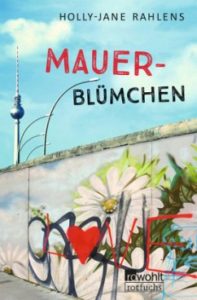 Wallflower is four hours in the life of Molly Lenzfeld, a sixteen-year-old New Yorker in Berlin. It’s Thanksgiving Day 1989, two weeks after the fall of the Wall. Molly, the daughter of a German-Jewish mother who fled the Nazis in 1938, is off to her mother’s birth house in East Berlin. On the train to Prenzlauer Berg, wallflower Molly meets East German wildflower Mick Maier, nineteen. It’s love at first sight. For both, it’s a journey into an unknown land and a world deep below the city’s streets – a fertile terrain in which to discover each other, the absurdities of the divided city, and, of course, the wonder of love.
Wallflower is four hours in the life of Molly Lenzfeld, a sixteen-year-old New Yorker in Berlin. It’s Thanksgiving Day 1989, two weeks after the fall of the Wall. Molly, the daughter of a German-Jewish mother who fled the Nazis in 1938, is off to her mother’s birth house in East Berlin. On the train to Prenzlauer Berg, wallflower Molly meets East German wildflower Mick Maier, nineteen. It’s love at first sight. For both, it’s a journey into an unknown land and a world deep below the city’s streets – a fertile terrain in which to discover each other, the absurdities of the divided city, and, of course, the wonder of love.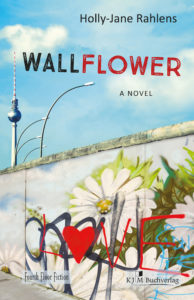 A slew of comic scenes embellished with a great love for detail. — Spiegel Online | Powerful and touching — Berliner Zeitung | … an absolute riot! — Aviva-Berlin | … truly hilarious! — FAZ | Have you ever read a novel that made you feel like you could see the movie version in your mind while you were reading it? That’s what I experienced when I read Wallflower. — Susanne M. Heim »Chicken Soup For the Soul« | A time machine into the past — Deutsche Presse Agentur | A real eye-opener — Politiken
A slew of comic scenes embellished with a great love for detail. — Spiegel Online | Powerful and touching — Berliner Zeitung | … an absolute riot! — Aviva-Berlin | … truly hilarious! — FAZ | Have you ever read a novel that made you feel like you could see the movie version in your mind while you were reading it? That’s what I experienced when I read Wallflower. — Susanne M. Heim »Chicken Soup For the Soul« | A time machine into the past — Deutsche Presse Agentur | A real eye-opener — Politiken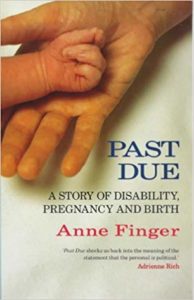 Anne Finger liest aus einem autobiographischen Text: “Past Due: A Story of Disability, Pregnancy and Birth”, der in deutscher Übersetzung von Christine Frick-Gehrke unter dem Titel “Lebenswert – eine behinderte Frau bekommt ein Kind” 1992 bei S. Fischer erschienen ist.
Anne Finger liest aus einem autobiographischen Text: “Past Due: A Story of Disability, Pregnancy and Birth”, der in deutscher Übersetzung von Christine Frick-Gehrke unter dem Titel “Lebenswert – eine behinderte Frau bekommt ein Kind” 1992 bei S. Fischer erschienen ist.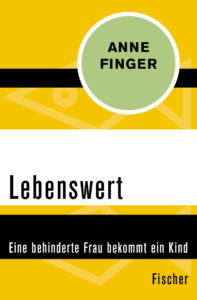 Anne Finger ist Autorin von Romanen, autobiografischen Texten und Sachbüchern; 2018 erschien ihr neuester Roman “A Woman, in Bed”. In ihrem Erzählungsband “Call Me Ahab” (2009) erzählen Behinderte – sowohl Figuren aus literarischen Texten als auch real existierende Mitmenschen – aus ihrer Perspektive. Ihr letztes Memoir “Elegy for a Disease: A Personal and Cultural History of Polio” erschien 2006. Anne lebt in Oakland / Kalifornien, wo sie sowohl in der Behindertenbewegung als auch in verschiedenen Gruppierungen und Bewegungen für breitangelegte gesellschaftliche Veränderung aktiv ist.
Anne Finger ist Autorin von Romanen, autobiografischen Texten und Sachbüchern; 2018 erschien ihr neuester Roman “A Woman, in Bed”. In ihrem Erzählungsband “Call Me Ahab” (2009) erzählen Behinderte – sowohl Figuren aus literarischen Texten als auch real existierende Mitmenschen – aus ihrer Perspektive. Ihr letztes Memoir “Elegy for a Disease: A Personal and Cultural History of Polio” erschien 2006. Anne lebt in Oakland / Kalifornien, wo sie sowohl in der Behindertenbewegung als auch in verschiedenen Gruppierungen und Bewegungen für breitangelegte gesellschaftliche Veränderung aktiv ist.
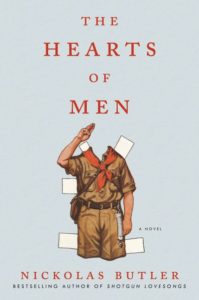 Camp Chippewa, 1962. Nelson Doughty, age thirteen, social outcast and overachiever, is the Bugler, sounding the reveille proudly each morning. Yet this particular summer marks the beginning of an uncertain and tenuous friendship with a popular boy named Jonathan.
Camp Chippewa, 1962. Nelson Doughty, age thirteen, social outcast and overachiever, is the Bugler, sounding the reveille proudly each morning. Yet this particular summer marks the beginning of an uncertain and tenuous friendship with a popular boy named Jonathan.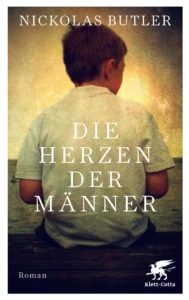 Nickolas Butler is the author of the novel Shotgun Lovesongs and a collection of short stories entitled Beneath the Bonfire.
Nickolas Butler is the author of the novel Shotgun Lovesongs and a collection of short stories entitled Beneath the Bonfire.